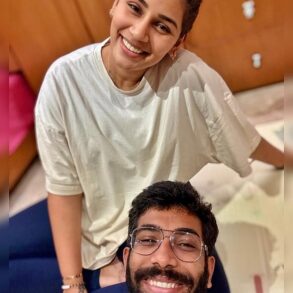A graphic designer who set up a business at the age of 13 says she did so to make other young black girls feel “beautiful and represented”.
After not seeing herself depicted on everyday items, Lo Williams set about printing her own designs.
Her brand, Lo Designz, has gone on to achieve global recognition, with fashion giant Gap featuring one of her slogans on its T-shirts.
She is now set on inspiring the next generation.
Her designs – emblazoned on an array of items including mugs and T-shirts – show black women with different skin tones and hairstyles.
“I couldn’t go out and buy a black Barbie that looked like me so I had the inspiration to create that [image] for young black girls, to show that they are beautiful, they are out here and they are being represented,” she said.
“Representation is very important, if you don’t see yourself you don’t know yourself.”
Ms Williams, from Dudley, set up the firm with her mum’s help in 2015.
Five years later, her design ‘Black Is My Happy Colour’ was picked up by Gap and sold in UK stores.
“The impact is what fuels my passion. I love creativity and seeing young girls and children get excited about what they can create,” the artist added.
Despite building a brand and network at a young age, Ms Williams says she has had to overcome several barriers.
“Because I started at such a young age, people didn’t take me seriously and even now, people still assume that it’s my mum’s business,” she said.
“Also, my skin tone. I’m fully Jamaican Black-British but many people have things to say about me being light-skinned, like they are trying to diminish my blackness.”
However, the future looks bright for the young entrepreneur, who also heads up a networking company and is a creative arts coach to children aged four to 16 years old.
“It’s about building an empire for my family and for young black girls, that’s all I want to do, make an impact,” she said.
Research has shown that people from ethnic minority backgrounds in Birmingham faced disproportionate challenges during the pandemic and in the aftermath, from accessing financial support to dealing with rising inflation and energy bills.
Despite this, the city has seen a growth in black-owned businesses and there is a support network of more than 20,000 people forming on Facebook.
For Ms Williams, social media platforms and initiatives such as Black Pound Day markets, which showcase businesses run by people from black backgrounds, have helped her to grow her brand and reach new audiences.
“I know that we don’t get enough recognition, support and investments so having a place like this to celebrate and promote is amazing,” said Asha Osman, 23, at a Black Pound Day market in Aston.
Cherelle Brown added that she’d like to see events being held all over the country to boost visibility.
“Over the last few years I’ve seen a definite improvement in people just trying, seeing they have a natural ability, and trying to push outside of the box and focus on their business.”
Meanwhile, Birmingham has become a hub for black-owned businesses, said Yvonne Nelson, who runs her own company.
“It’s a beautiful place and community, the way everyone looks after each other and comes together as one people, it’s fantastic.”
Follow BBC West Midlands on Facebook, X and Instagram. Send your story ideas to: newsonline.westmidlands@bbc.co.uk






